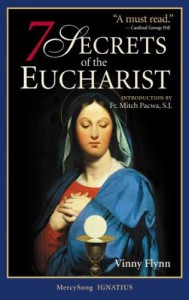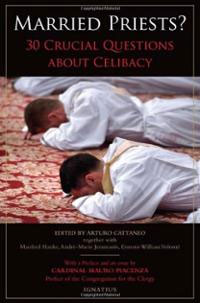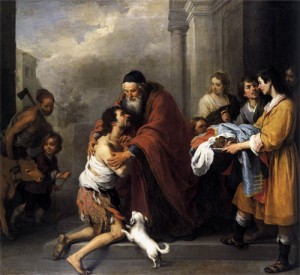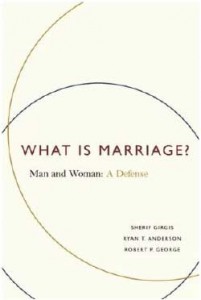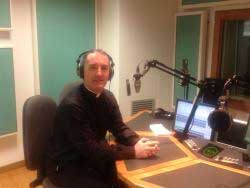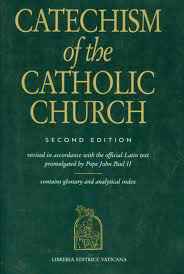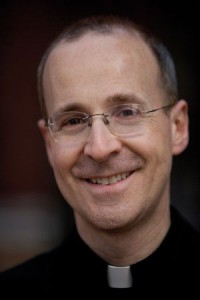 Here is a special interview we had with Fr. James Martin, SJ discussing St. Ignatius of Loyola
Here is a special interview we had with Fr. James Martin, SJ discussing St. Ignatius of Loyola
[powerpress]
ADDRESS OF HIS HOLINESS BENEDICT XVI
TO THE FATHERS AND BROTHERS OF THE SOCIETY OF JESUS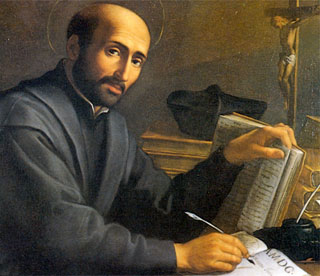
Vatican Basilica
Saturday, 22 April 2006 Â from vatican.va
Dear Fathers and Brothers of the Society of Jesus,
I meet you with great joy in this historical Basilica of St Peter’s after the Holy Mass celebrated for you by Cardinal Angelo Sodano, my Secretary of State, on the occasion of combined jubilees of the Ignatian Family. I address my cordial greeting to you all.
I greet in the first place the Superior General, Fr Peter-Hans Kolvenbach, and thank him for his courteous words expressing your common sentiments to me. I greet the Cardinals with the Bishops and priests and all those who have desired to participate in this event.
Together with the Fathers and Brothers, I also greet the friends of the Society of Jesus present here, and among them, the
many men and women religious, members of the Communities of Christian Life and of the Apostolate of Prayer, the students and alumnae with their families from Rome, from Italy and from Stonyhurst in England, the teachers and students of the academic institutions and the many collaborators.
Your visit today gives me the opportunity to thank the Lord with you for having granted your Society the gift of men of extraordinary holiness and exceptional apostolic zeal, such as St Ignatius of Loyola, St Francis Xavier and Bl. Peter Faber. For you they are the Fathers and Founders: it is therefore appropriate that in this centenary year you commemorate them with gratitude and look to them as enlightened and reliable guides on your spiritual journey and in your apostolic activities.
St Ignatius of Loyola was first and foremost a man of God who in his life put God, his greatest glory and his greatest service, first. He was a profoundly prayerful man for whom the daily celebration of the Eucharist was the heart and crowning point of his day.
Thus, he left his followers a precious spiritual legacy that must not be lost or forgotten. Precisely because he was a man of God, St Ignatius was a faithful servant of the Church, in which he saw and venerated the Bride of the Lord and the Mother of Christians. And the special vow of obedience to the Pope, which he himself describes as “our first and principal foundation” (MI, Series III, I., p. 162), was born from his desire to serve the Church in the most beneficial way possible. (more…)
Tags: american magazine, celebration, fr. james martin, heart, James Martin, st. ignatius, st. ignatius of loyola
This entry was posted on Wednesday, July 31st, 2013 at 1:45 am
You can follow any responses to this entry through the RSS 2.0 feed.
Our conversation with Vinny Flynn, on the  “Seven Secrets of the Eucharist”, is one of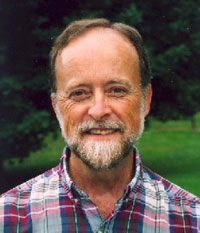 the most popular interviews we have had on the Morning Show. Vinny’s love for the Eucharist pours out in his descriptions of just some of the beautiful “secrets” found in this great mystery and gift to us all.  Find out also the great connection between the Divine Mercy and the Eucharist (it really isn’t a secret…thank you St. Faustina!).
the most popular interviews we have had on the Morning Show. Vinny’s love for the Eucharist pours out in his descriptions of just some of the beautiful “secrets” found in this great mystery and gift to us all. Â Find out also the great connection between the Divine Mercy and the Eucharist (it really isn’t a secret…thank you St. Faustina!).
[powerpress]
If you are looking for new ways to increase your devotion to Our Lord in the Holy Eucharist, this is the book for you, and I suggest you buy several copies for your friends. — Fr. Benedict Groeschel, C.F.R.
This book will change your understanding and experience of the Holy Eucharist in an amazing way. Each of the 7 Secrets of the Eucharist will lead you into the fire of ‘Eucharistic amazement’ called for by Pope john Paul II (Ecclesia de Eucharistia). Fr. George W. Kosicki, C.S.B.
This little book is a real gem. A `must read’ for any Catholic. In fact, I would recommend this book to anyone. –George Cardinal Pell, Archbishop of Sydney
Tags: Benedict Groeschel, divine mercy, eucharist, holy eucharist, ignatius press, morning show, Vinny Flynn
This entry was posted on Sunday, June 2nd, 2013 at 6:55 am
You can follow any responses to this entry through the RSS 2.0 feed.
“Married Priests? 30 Crucial Questions about Celibacy” is the go to book when seeking answers to just about everything related to the  Church’s teaching and exprience in regards to priestly celibacy.  With Fr. Joseph Fessio S.J., 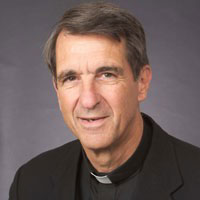 editor and founder of Ignatius Press the publisher of this work, we discuss several of those questions.  Why do Catholic priests not marry? How can celibacy possibly be so important to the Church, if Jesus did not even require it of his apostles?  How does this discipline play into the discernment for this particular vocation?  We also discuss the vocation of Marriage, and the state of Church in America from Fr. Fessio’s prespective.  It is always a joy to have the opportunity to talk with Fr. Fessio.
editor and founder of Ignatius Press the publisher of this work, we discuss several of those questions. Â Why do Catholic priests not marry? How can celibacy possibly be so important to the Church, if Jesus did not even require it of his apostles? Â How does this discipline play into the discernment for this particular vocation? Â We also discuss the vocation of Marriage, and the state of Church in America from Fr. Fessio’s prespective. Â It is always a joy to have the opportunity to talk with Fr. Fessio.
[powerpress]
You can find the book here
From the book description:
In recent years the arguments in favor of openness to married priests seem to be multiplying. Some object that celibacy is not a dogma but only a discipline that originated in the Middle Ages; that it is contrary to nature and hence harmful for a man’s psycho-physical equilibrium and the maturation of the human personality. And then, if priests could marry, there would be an increase in vocations.
In this book, seventeen various experts make contributions, responding to these and other burning objections, allowing the reader to discover the value that celibacy has today in the lives of thousands of priests and seminarians.
Among the key topics this book discusses are: History of Priestly Celibacy, What Theology Says on the Celibacy, Emotions and Sexuality, Discerning and Fostering a Vocation, Celibacy in the Life of a Priest, Celibacy and Inculturation, Papal teachings on Celibacy from Pius XI to Benedict XVI.
Tags: joseph fessio, Joseph Fessio S.J., married priests, priestly celibacy
This entry was posted on Tuesday, April 23rd, 2013 at 1:08 am
You can follow any responses to this entry through the RSS 2.0 feed.
Msgr. Esseff reflects on the readings for the 4th Sunday of Lent.  He discusses  the Sacrament of Reconciliation and how it’s key in the area of true inner healing.  The healing from the damage done by our sinful choices is more important than even physical healing.  He implores us all to see the value of this tremendous gift.
From the NAB
Gospel LK 15:1-3, 11-32
Tax collectors and sinners were all drawing near to listen to Jesus,
but the Pharisees and scribes began to complain, saying,
“This man welcomes sinners and eats with them.â€
So to them Jesus addressed this parable:
“A man had two sons, and the younger son said to his father,
‘Father give me the share of your estate that should come to me.’
So the father divided the property between them.
After a few days, the younger son collected all his belongings
and set off to a distant country
where he squandered his inheritance on a life of dissipation.
When he had freely spent everything,
a severe famine struck that country,
and he found himself in dire need.
So he hired himself out to one of the local citizens
who sent him to his farm to tend the swine.
And he longed to eat his fill of the pods on which the swine fed,
but nobody gave him any.
Coming to his senses he thought,
‘How many of my father’s hired workers
have more than enough food to eat,
but here am I, dying from hunger.
I shall get up and go to my father and I shall say to him,
“Father, I have sinned against heaven and against you.
I no longer deserve to be called your son;
treat me as you would treat one of your hired workers.â€â€™
So he got up and went back to his father.
While he was still a long way off,
his father caught sight of him, and was filled with compassion.
He ran to his son, embraced him and kissed him.
His son said to him,
‘Father, I have sinned against heaven and against you;
I no longer deserve to be called your son.’
But his father ordered his servants,
‘Quickly bring the finest robe and put it on him;
put a ring on his finger and sandals on his feet.
Take the fattened calf and slaughter it.
Then let us celebrate with a feast,
because this son of mine was dead, and has come to life again;
he was lost, and has been found.’
Then the celebration began.
Now the older son had been out in the field
and, on his way back, as he neared the house,
he heard the sound of music and dancing.
He called one of the servants and asked what this might mean.
The servant said to him,
‘Your brother has returned
and your father has slaughtered the fattened calf
because he has him back safe and sound.’
He became angry,
and when he refused to enter the house,
his father came out and pleaded with him.
He said to his father in reply,
‘Look, all these years I served you
and not once did I disobey your orders;
yet you never gave me even a young goat to feast on with my friends.
But when your son returns
who swallowed up your property with prostitutes,
for him you slaughter the fattened calf.’
He said to him,
‘My son, you are here with me always;
everything I have is yours.
But now we must celebrate and rejoice,
because your brother was dead and has come to life again;
he was lost and has been found.’â€
Msgr. John A. Esseff is a Roman Catholic priest in the Diocese of Scranton. He was ordained on May 30th 1953, by the late Bishop William J. Hafey, D.D. at St. Peter’s Cathedral in Scranton, PA. Msgr. Esseff served a retreat director and confessor to Blessed Mother Teresa.   He continues to offer direction and retreats for the sisters of the missionaries of charity around the world. Msgr. Esseff encountered St.  Padre Pio,  who would become a spiritual father to him. He has lived in areas around the world,  serving  in the Pontifical missions, a Catholic organization established by Bl. Pope John Paul II to bring the Good News to the world especially to the poor. Msgr. Esseff assisted the founders of the Institute for Priestly Formation and continues to serve as a spiritual director for the Institute. He continues to  serve as a retreat leader and director to bishops, priests and sisters and seminarians and other religious leaders around the world.  Â
To obtain a copy of Msgr. Esseff’s book by visiting here
Be sure to visit Msgr. Esseff’s website “Building a Kingdom of  Love”
Tags: choices, inner healing, John Esseff, NAB
This entry was posted on Sunday, March 10th, 2013 at 3:20 pm
You can follow any responses to this entry through the RSS 2.0 feed.
This is such an interesting conversation Bruce and I had with author John Salza! Â We discussed this time around, “The Biblical Basis for the Papacy”. Â Fascinating.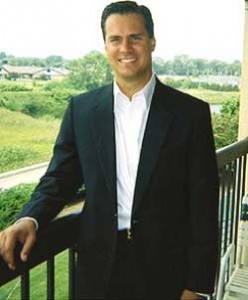
[powerpress]
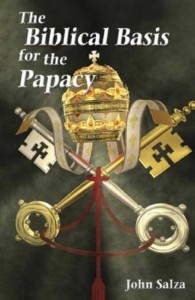 You can purchase the book here
You can purchase the book here
From the book description:
The Roman Catholic Papacy is the longest-living institution in the Western World – and at times one of the most controversial due to the basic doctrines of: Papal Authority, Papal Infallibility and Apostolic Succession. Drawing upon Old and New Testament Scripture, Tradition, and the words of the Early Church Fathers, author and noted Catholic apologist John Salza presents a comprehensive and compelling story of the office of the papacy from a biblical perspective. Arguments against the papacy are weighed and refuted in a charitable but convincing manner, making this a valuable resource for everyone intrigued or confused by the nearly 2,000 year old papal office – regardless of your faith background. Whether you are defending, questioning or exploring the Catholic Faith, this book provides the most concise and clear examination of the Catholic Church’s supreme teaching office as instituted by Christ, Our Lord and Savior.
Tags: catholic church, early church fathers, john salza, papacy
This entry was posted on Sunday, March 3rd, 2013 at 3:37 pm
You can follow any responses to this entry through the RSS 2.0 feed.
“Eucharistic Adoration: Holy Hour Meditations on the Seven Last Words of Christ” is a marvelous book for 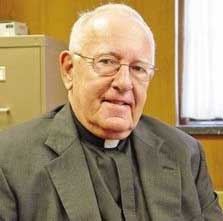 enhancing your experience of one of the Church’s richest devotions.  Msgr. Charles Murphy pours into this work over 50 years of priestly life and pastoral experience in spreading the devotion to the Blessed Sacrament.  He ties together reflections on the seven last words of Jesus with the profiles of seven modern Christians known for their devotion to the Eucharist, including Simone Weil, Edith Stein, Dorothy Day, Blessed John XXIII, Blessed John Paul II, Blessed Teresa of Calcutta, and St. Margaret Mary Alacoque.  In this conversation, we also discuss his book “The Spirituality of Fasting”
enhancing your experience of one of the Church’s richest devotions.  Msgr. Charles Murphy pours into this work over 50 years of priestly life and pastoral experience in spreading the devotion to the Blessed Sacrament.  He ties together reflections on the seven last words of Jesus with the profiles of seven modern Christians known for their devotion to the Eucharist, including Simone Weil, Edith Stein, Dorothy Day, Blessed John XXIII, Blessed John Paul II, Blessed Teresa of Calcutta, and St. Margaret Mary Alacoque.  In this conversation, we also discuss his book “The Spirituality of Fasting”
[powerpress]
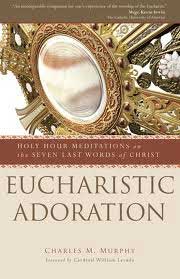 You can find the book here
You can find the book here
Monsignor Charles M. Murphy is currently the director of the permanent diaconate for the Diocese of Portland, Maine. He is the author of a number of scholarly articles and several books, including The Spirituality of Fasting, At Home on the Earth, Wallace Stevens: A Spiritual Poet in a Secular Age, and Belonging to God. Murphy is the former academic dean and rector of the Pontifical North American College in Rome and served as part of the editorial group working in Italy under Cardinal Ratzinger on the third draft of the Catechism of the Catholic Church, which became the fourth and final version.
Murphy currently serves as consultant to the United States Conference of Catholic Bishops committee on catechetics, reviewing materials for conformity with the Catechism. He served as chair of the editorial committee that produced the pastoral letter on environmental issues by the Bishops of the Boston Province and he served as a consultant to the USCCB for their statement on global warming. He has been the pastor of four parishes in Maine and has served his diocese in ecumenical and educational capacities. Murphy holds a doctorate in sacred theology from the Gregorian University, a master’s degree in education from Harvard University, and a bachelor’s degree in classics from the College of the Holy Cross.
Tags: Charles Murphy, eucharistic adoration, margaret mary alacoque, Simone Weil
This entry was posted on Tuesday, February 19th, 2013 at 2:48 pm
You can follow any responses to this entry through the RSS 2.0 feed.
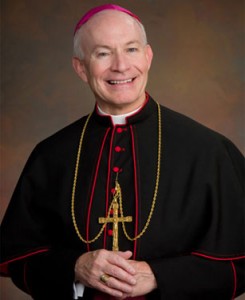 Archbishop Lucas begins a  video series on the Sacrament of Penance
Archbishop Lucas begins a  video series on the Sacrament of Penance
Be sure to check out more from the Archbishop on this sacrament  at  USCCA19 – The United States Catholic Catechism for Adults with Archbishop George Lucas – Chap. 18 Sacrament of Penance and Reconciliation – God is Rich in Mercy
Tags: Archbishop George Lucas, sacrament
This entry was posted on Thursday, February 7th, 2013 at 8:00 am
You can follow any responses to this entry through the RSS 2.0 feed.
 Archbishop Lucas begins a  video series on the Sacrament of Penance
Archbishop Lucas begins a  video series on the Sacrament of Penance
Be sure to check out more from the Archbishop on this sacrament  at  USCCA19 – The United States Catholic Catechism for Adults with Archbishop George Lucas – Chap. 18 Sacrament of Penance and Reconciliation – God is Rich in Mercy
Tags: Archbishop Lucas, sacrament
This entry was posted on Wednesday, February 6th, 2013 at 10:38 am
You can follow any responses to this entry through the RSS 2.0 feed.
 Archbishop Lucas begins a  video series on the Sacrament of Penance
Archbishop Lucas begins a  video series on the Sacrament of Penance
Be sure to check out more from the Archbishop on this sacrament  at  USCCA19 – The United States Catholic Catechism for Adults with Archbishop George Lucas – Chap. 18 Sacrament of Penance and Reconciliation – God is Rich in Mercy
Tags: Archbishop George Lucas, Archbishop Lucas, sacrament
This entry was posted on Tuesday, February 5th, 2013 at 5:24 pm
You can follow any responses to this entry through the RSS 2.0 feed.
Episode 15 -The Way of Mystery: The Eucharist and Moral Living– The journey begins into the unitive way…the beginning of falling in love with God. Combined with the entry into the sacramental life, the living out the moral life becomes more than meeting a “goal”, but becomes a “way” of life.
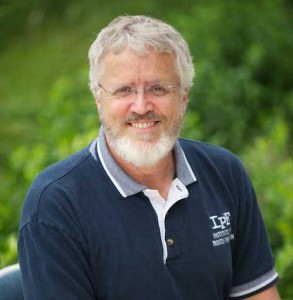
[powerpress]
Deacon James Keating, PhD, the director of Theological Formation for the Institute for Priestly Formation, located at Creighton University, in Omaha, is making available to â€Discerning Hearts†and all who listen, his series of programs entitled “The Way of Mysteryâ€.
 The Vatican II documents remind us that the spiritual journey is not made in a vacuum, that God has chosen to save us, not individually, but as The People of God. The Eucharist must help Christians to make their choices by discerning out of Christ’s paschal mystery. For this process to take place, however, Christians must first understand how the Eucharist puts them in touch with Christ’s passion, death, and resurrection, and what concrete implications being in touch with this mystery has for their daily lives.
The Vatican II documents remind us that the spiritual journey is not made in a vacuum, that God has chosen to save us, not individually, but as The People of God. The Eucharist must help Christians to make their choices by discerning out of Christ’s paschal mystery. For this process to take place, however, Christians must first understand how the Eucharist puts them in touch with Christ’s passion, death, and resurrection, and what concrete implications being in touch with this mystery has for their daily lives.
For more information on the “Institute of Priestly Formation†and for other material available by Deacon Keating, just click here
Don’t forget to pickup a copy of “Communion with Christ†, it is one of the best audio sets on prayer…ever!
Check out Deacon Keating’s “Discerning Heart†page
Tags: choices, creighton university, Deacon James Keating, eucharist, sacramental life, the unitive way, unitive way
This entry was posted on Monday, January 21st, 2013 at 6:12 am
You can follow any responses to this entry through the RSS 2.0 feed.
Dr. Robert George, Princeton professor of Philosophy, discusses why we must first answer the question of what marriage really is 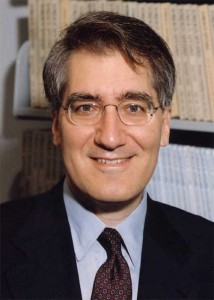 before we can begin to defend the institution of marriage.  He, and his co-authors, contend that marriage is a comprehensive union of mind and body, a conjugal union, ordered to family life, which unites a man and a woman as husband and wife.  They document the social value of applying this principle in law.
before we can begin to defend the institution of marriage. Â He, and his co-authors, contend that marriage is a comprehensive union of mind and body, a conjugal union, ordered to family life, which unites a man and a woman as husband and wife. Â They document the social value of applying this principle in law.
[powerpress]
You can find the book here
From the book description:
What Is Marriage? decisively answers common objections: that the historic view is rooted in bigotry, like laws forbidding interracial marriage; that it is callous to people’s needs; that it can’t show the harm of recognizing same-sex couplings, or the point of recognizing infertile ones; and that it treats a mere “social construct” as if it were natural, or an unreasoned religious view as if it were rational.
“With many countries on the verge of redefining a basic social institution, What Is Marriage? issues an urgent call for full deliberation of what is at stake. The authors make a compelling secular case for marriage as a partnership between a man and a woman, whose special status is based on society’s interest in the nurture and education of children.”
–Â Mary Ann Glendon, Learned Hand Professor of Law, Harvard University
Tags: family life, marriage, Mary Ann Glendon, Robert George
This entry was posted on Wednesday, January 16th, 2013 at 1:06 am
You can follow any responses to this entry through the RSS 2.0 feed.
[powerpress]
Msgr. Esseff reflects on the meaning of the “Baptism” and how it transforms us all.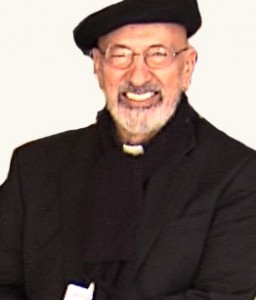
Gospel   LK 3:15-16, 21-22
The people were filled with expectation,
and all were asking in their hearts
whether John might be the Christ.
John answered them all, saying,
“I am baptizing you with water,
but one mightier than I is coming.
I am not worthy to loosen the thongs of his sandals.
He will baptize you with the Holy Spirit and fire.â€
After all the people had been baptized
and Jesus also had been baptized and was praying,
heaven was opened and the Holy Spirit descended upon him
in bodily form like a dove.
And a voice came from heaven,
“You are my beloved Son;
with you I am well pleased.â€
Msgr. John A. Esseff is a Roman Catholic priest in the Diocese of Scranton. He was ordained on May 30th 1953, by the late Bishop William J. Hafey, D.D. at St. Peter’s Cathedral in Scranton, PA. Msgr. Esseff served a retreat director and confessor to Blessed Mother Teresa.   He continues to offer direction and retreats for the sisters of the missionaries of charity around the world. Msgr. Esseff encountered St.  Padre Pio,  who would become a spiritual father to him. He has lived in areas around the world,  serving  in the Pontifical missions, a Catholic organization established by Bl. Pope John Paul II to bring the Good News to the world especially to the poor. Msgr. Esseff assisted the founders of the Institute for Priestly Formation and continues to serve as a spiritual director for the Institute. He continues to  serve as a retreat leader and director to bishops, priests and sisters and seminarians and other religious leaders around the world.  Â
To obtain a copy of Msgr. Esseff’s book by visiting here
Be sure to visit Msgr. Esseff’s website “Building a Kingdom of  Love”
Tags: Good News, John Esseff, PA, retreat
This entry was posted on Wednesday, January 16th, 2013 at 12:49 am
You can follow any responses to this entry through the RSS 2.0 feed.
Episode 29- Regnum Novum: Bringing forth the New Evangelization through Catholic Social Teaching with Omar Gutierrez – We continue the study of the “Compendium of the Social Doctrine of the Church” Â Chapter 5 – What is marriage?
– We continue the study of the “Compendium of the Social Doctrine of the Church” Â Chapter 5 – What is marriage?
[powerpress]
CHAPTER FIVE
THE FAMILY, THE VITAL CELL OF SOCIETY
II. MARRIAGE, THE FOUNDATION OF THE FAMILY
a. The value of marriage
b. The sacrament of marriage
III. THE SOCIAL SUBJECTIVITY OF THE FAMILY
a. Love and the formation of a community of persons
b. The family is the sanctuary of life
c. The task of educating
d. The dignity and rights of children
IV. THE FAMILY AS ACTIVE PARTICIPANT IN SOCIAL LIFEÂ
a. Solidarity in the family
b. The family, economic life and work
V. SOCIETY AT THE SERVICE OF THE FAMILY
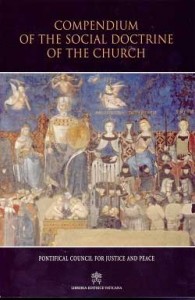
We live at a very special time. The confluence of many things has brought forth the clear need to be able to articulate the Social Teaching of the Catholic Church in a way that is accessible and applicable. This is not to be an effort where high-minded theories are to be bandied about. Rather, this is a time of opportunity wherein we can apply the Social Doctrine to the concrete so as to bring about a New Kingdom, a Revolution. – Omar G.
Also visit Omar’s “Discerning Hearts” page Catholic Social Teaching 101
Tags: catholic social teaching, marriage, social doctrine, Social Teaching, special time
This entry was posted on Tuesday, January 15th, 2013 at 2:39 pm
You can follow any responses to this entry through the RSS 2.0 feed.
In part three of our series answering listener’s questions of faith, Monsignor John Kennedy, an official at the Congregation for the Doctrine of the Faith, answers a question from a listener in Korea who has asked how often we should go to Confession. In this weeks episode, Monsignor Kennedy brings us on a journey of rediscovery of the Sacrament of Reconciliation.
Listen: [powerpress]
Tags: faith, Korea, Monsignor John Kennedy, Monsignor Kennedy, vatican radio
This entry was posted on Wednesday, December 19th, 2012 at 5:50 am
You can follow any responses to this entry through the RSS 2.0 feed.
Episode 28- Regnum Novum: Bringing forth the New Evangelization through Catholic Social Teaching with Omar Gutierrez – We continue the study of the “Compendium of the Social Doctrine of the Church” Â Chapter 5
– We continue the study of the “Compendium of the Social Doctrine of the Church” Â Chapter 5
[powerpress]
CHAPTER FIVE
THE FAMILY, THE VITAL CELL OF SOCIETY
I. THE FAMILY, THE FIRST NATURAL SOCIETY
a. Importance of the family for the person
b. Importance of the family for society
II. MARRIAGE, THE FOUNDATION OF THE FAMILY
a. The value of marriage
b. The sacrament of marriage

We live at a very special time. The confluence of many things has brought forth the clear need to be able to articulate the Social Teaching of the Catholic Church in a way that is accessible and applicable. This is not to be an effort where high-minded theories are to be bandied about. Rather, this is a time of opportunity wherein we can apply the Social Doctrine to the concrete so as to bring about a New Kingdom, a Revolution. – Omar G.
Also visit Omar’s “Discerning Hearts” page Catholic Social Teaching 101
Tags: catholic social teaching, marriage, social doctrine, special time, Subsidiarity
This entry was posted on Tuesday, December 18th, 2012 at 1:09 pm
You can follow any responses to this entry through the RSS 2.0 feed.

